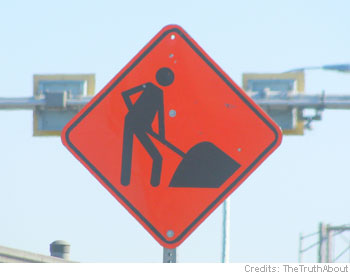 One of the constant themes of modern socialism (and Keynesianism) is the belief that we can create prosperity through government spending on roads. Mind you, roads can help an economy if they are located in places where they can aid commerce by making it possible for relatively cheap transportation that permits wider uses of division of labor.
One of the constant themes of modern socialism (and Keynesianism) is the belief that we can create prosperity through government spending on roads. Mind you, roads can help an economy if they are located in places where they can aid commerce by making it possible for relatively cheap transportation that permits wider uses of division of labor.
However, that is not why people like Paul Krugman and other socialists champion tax-funded road building. Instead, they insist that the money spent in itself will revitalize the economy, and that is pure nonsense. Interestingly, this past year has seen a huge amount of government “public works” spending, but the effects have not been what the Krugmanites/Socialists have claimed.
A recent AP article notes that a number of economists have examined the results of this road building, and find them wanting:
Ten months into President Barack Obama’s first economic stimulus plan, a surge in spending on roads and bridges has had no effect on local unemployment and only barely helped the beleaguered construction industry, an Associated Press analysis has found.
Spend a lot or spend nothing at all, it didn’t matter, the AP analysis showed: Local unemployment rates rose and fell regardless of how much stimulus money Washington poured out for transportation, raising questions about Obama’s argument that more road money would address an “urgent need to accelerate job growth.”
This is not surprising, but no doubt the Krugmanites/Socialists will have an answer declaring that the real problem was that the government did not spend enough. Spend more, they tell us, and then you will see the positive results.
Why has this spending not had the desired effect? To answer that, one has to understand that an economy is not an amorphous blob into which one pours money in order to make the recipe complete. An economy has a very complex set of relationships in which all factors are valued relative to one another, and in the end the value of those factors of production is determined by the value that consumers place upon the final product that those factors create.
In other words, coal is valuable because it helps to make electricity, which we value. Electricity does not receive its value from coal; coal receives its value from electricity.
Furthermore, an economy that is functioning correctly is one in which the factors either are in balance or are not prevented from finding their proper relationships with one another. By piling on spending and forcing factors to be expended on pet government projects, the Obama administration (like the Bush administration before it) actually is diverting factors from the use that consumers prefer to uses that the political classes and their allies prefer.
This move actually makes economic activity more distorted and prevents the recovery from occurring. In fact, I can say confidently that this forced “massive public works” emphasis is making us poorer because it actually is a massive wealth transfer from the productive to the non-productive economic sectors.
To use a term from Peter Schiff, the government is destroying wealth, and that makes us poorer. Furthermore, as government continues to pound square pegs into round holes, the net effect will be to destroy more wealth and throw many more people into unemployment and poverty.
This is something the Austrian Economists understand instinctively. Keynesians and Krugmanites are clueless, and while they revel in their cluelessness and their ignorance is celebrated in the media as Great Wisdom, nonetheless, they are ignorant people, but (unfortunately) ignorant people who are influencing the government to destroy what is left of our economy.
Indeed, the “shovel-ready” projects are shoveling something, alright, but it is not dirt. I don’t think I need to emphasize that the nonsense they are shoveling at us comes from the back end of a bull.
- Bulenox: Get 45% to 91% OFF ... Use Discount Code: UNO
- Risk Our Money Not Yours | Get 50% to 90% OFF ... Use Discount Code: MMBVBKSM
Disclaimer: This page contains affiliate links. If you choose to make a purchase after clicking a link, we may receive a commission at no additional cost to you. Thank you for your support!


I like this Schiff guy. I have been listening to clips of his for a couple of months now, and the guy makes a lot of sense at least to me.